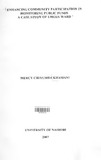| dc.contributor.author | Khasiani, Mercy C | |
| dc.date.accessioned | 2013-06-07T12:19:37Z | |
| dc.date.available | 2013-06-07T12:19:37Z | |
| dc.date.issued | 2007 | |
| dc.identifier.citation | PGD-HRM | en |
| dc.identifier.uri | http://erepository.uonbi.ac.ke:8080/xmlui/handle/123456789/30076 | |
| dc.description.abstract | The Purpose of this study was to determine the effectiveness of community participation
in development and monitoring the use of Public Funds. The study also shows the impact
of community participation or lack of it, on community development. Literature Review
and studies indicate the benefits of community participation in monitoring funds. It is
imperative for Kenyans to understand the forces at work within their respective
communities in order to enhance community participation in order to achieve sustainable
development.
This Study also seeks to determine ways of enhancing community participation III
development and monitoring the use of public funds. The study outlines the importance
of community participation in development and monitoring the use of funds. It also
outlines the ways in which the community can participate in such monitoring. The Study
seeks to identify the nexus between community participation and sustainable
development. Where community participation is lacking, the study identifys the effect of
that state of affairs on community development and management• of public funds .
The following Specific Objectives guided the Study:
• To create awareness and public education on the existence of the Community
Development Fund and The Local Authority Transfer Fund
• To create consciousness, critical awareness and understanding of major
contemporary problems, in this case, embezzlement and misuse of public
funds.
• To enable the community accomplish more with their limited resources
• To provide many opportunities of educating and enlightening people on the
importance of monitoring the use of public funds
The study is descriptive in nature and employs the survey method of primary data
collection. The main instrument for data collection is the questionnaire. The study was
conducted among a sample of 4 (four) estates residents of Umoja Ward. The respondents
are full time residents of Umoja Ward and drawn from young to old residents within each
household.
Data was analyzed using the SPSS soft ware and findings presented logically in tables,
graphs and Pie charts. | en |
| dc.description.sponsorship | university of Nairobi | en |
| dc.language.iso | en | en |
| dc.title | Enhancing community participation in monitoring public funds a case study of Umoja ward | en |
| dc.type | Thesis | en |
| local.publisher | College of Education and External Studies, University of Nairobi | en |

